Thus far in two prior posts I’ve suggested that the end-point of a graduate education is to “become a person” in the Biblical sense – that is, to grow into the image of God. This holistic vision will encompass within itself more common educational ideals such as becoming an intelligent, productive citizen and serving the good of humanity.
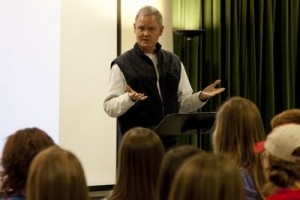
Secondly, I asked readers to integrate their faith with their field of study, and to do so in the context of Christian community. I hope you’ll take time to read these two earlier posts if you haven’t already.
- Headed to Graduate School: Begin with the End in Mind
- Headed to Graduate School: A Time of Re-imaging
This post is about witness, which can be a tall (and intimidating) order in the academy. I should know. My main job on InterVarsity staff is to travel around the country and speak privately and publicly with students and faculty about Jesus. To say the least, folks on campus are often not very receptive (though sometimes they are).
Professionally, however, I don’t have as much at stake as you – if you’re a grad student or a professor seeking tenure. This isn’t the place to rehearse the tragic stories of scholars who’ve spoken out in the name of Christ only to be “rewarded” with the ruin of their studies or professorships, but we know that it sometimes happens.
Practical Suggestions
So let me suggest some practical ways to be a witness for Christ in the academy. And no, these come with no guarantees of political safety.

- Stay faithful to your church, campus fellowship and personal devotions. I suppose this is merely stating the obvious, but you may not think it so obvious when you examine closely the lives of some academic Christians. Out of touch with God as they are, they find it nearly impossible to share Him with others.
- Pray your way into great conversations and places of influence.
- Become an excellent scholar in your field.
- Know how your faith and the Christian worldview intersect with your discipline. For an example of such integration, see my prior post, i.e., Headed to Graduate School: A Time of Re-imaging.
- Know the Biblical story. Learn it inside and out.
- Know something of the Christian tradition – the patristics, the divide between east and west, the Reformers (etc.). I’m always amazed at how people of other “tribal” groups on campus can speak knowledgeably about their doctrines and traditions, but Christians often cannot.
- Learn some basic Christian apologetics.
- Speak respectfully and thoughtfully about ultimate matters such as religion, politics and ethics. Listen carefully. Adopt the posture of a learner. You’ll find that many nonChristian friends and colleagues will return the favor.
- Identify yourself as a Christian early in professional relationships. This is where fear of losing status and position may set in, and I’m not saying it’s unfounded. Yet, here is your opportunity to trust God with your whole career, just as you’ve trusted him with your whole life (and beyond). The alternative is to live out a “neutral” and merely ethical public existence, while maintaining a privatized faith of prayer and church-going and the like. But in my opinion this divided life is not biblical Christianity, not the “personhood” that I argued for in my prior posts.
- Share the gospel gently and respectfully as God provides opportunity. In a recent ESN reprint, Nicholas Wolterstorff puts it this way: “The project of being a Christian scholar is the project of thinking with a Christian mind and speaking with a Christian voice within your chosen discipline and within the academy more generally.” [italics mine]
Common Ground – or Not
- Learn when to stand on common ground and when to retreat into tribal epistemology. This may sound technical and confusing so I’d like to expand on it a bit, because I believe it is critical. The first thing I look for in a conversation or relationship is common ground. This may be established by light conversation on topics of common interest – hobbies, vacations, family stories, favorite restaurants, etc. At some point you go deeper. The dialogue turns to opinions about public policy or university affairs or politics. Your friend speaks from a nonChristian perspective of some sort and you from a Biblical outlook. Yet, no big lines are traversed. You haven’t yet said, “Well, the Bible says . . . “
But then let’s say your friend throws some little grenade into the conversation such as “religion has been the cause of all the wars,” or “those Intelligent Design [ID] idiots are trying to take over.” Now you need a thoughtful response. You’re still on common ground so you make a defense that appeals universally to “any reasonable person.” You say that yes, religion has caused wars, but so has geography and so has politics. And then you explain what you mean.[i]
And whether or not you identify with the ID perspective per se, you may feel some compulsion to at least defend the idea of God designing the universe. But your friend merely scoffs at all this and you realize you’re losing the supposed “common ground” by which the two of you, together, evaluate truth claims.
SO: You make a big move. You shift gears. You retreat to tribal epistemology. That is, you begin speaking explicitly from within the confines of the Christian tradition. You worry less about translating the tradition into neutralized “public-speak” and more about getting your own tradition out there accurately. You say things like, “In the evangelical tradition . . . “ or “From a Catholic perspective . . . “ or “Evangelicals have always held that . . . “ or “A Biblical way of seeing the issue is this . . . ” Appeal to your heritage, to the Christian way, to the Biblical worldview. Make no apology. There are many tribes on campus, each with its own history and narrative. Yours is Christian. Don’t be ashamed of it. Especially when “common ground” fails, speak up as a Christian
I wish this post were ten times longer so I could elaborate further on all the points above, particularly the final one. Alas, this must do for now. If you wish to talk further about witness in higher education, please email me (rick55104 at yahoo.com). This is my life work and I’d love to have a chat with you!
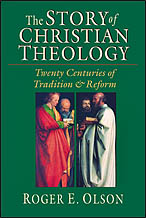
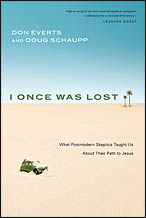
Recommended Resources
For a profound (I do not use this word lightly) look at how postmodern people come to faith in Christ in incremental steps, see I Once Was Lost by Schaupp and Everts. Written for undergrads, the book has serious ramifications for graduate witness as well.
For a readable history of the Christian worldview, see The Story of Christian Theology by Roger Olson.
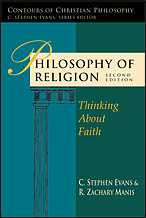
For an underlying philosophical perspective on apologetic issues such as evil, pluralism, faith and knowledge, God’s existence, and religious experience, see Philosophy of Religion, 2nd ed., by Evans and Manis. Readable for non-philosophers and helpful for thoughtful conversation about ultimate concerns.
For a theological perspective on epistemology in the university, see To Know and Love God by David Clark, esp. chapter 4, where he discusses the difference between incongruity and incommensurability (p137). The former is where two people of differing worldviews can talk roughly in the same terms about an issue, though disagreeing (e.g., an atheist and a Christian discussing God’s existence). This is the “common ground” mentioned above. Incommensurability, however, means that the criteria each party uses to think about truth is so divergent that they cannot really communicate meaningfully with each other. This is the point at which I recommend a retreat into tribalism – that is, speaking explicitly from within your paradigm and letting the chips fall where they may.
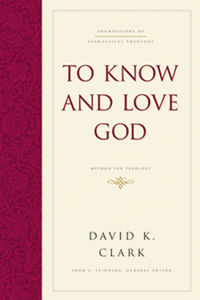
[i] Theologian David Clark notes that “We are responsible for communicating our reasoning by appealing to the sorts of evidence that nonChristians can understand” (To Know and Love God, p206).
[ii] I must add one note of qualification on this point about tribalism: Some apologists deny the possibility of “common ground” with nonChristians; so right from the start they speak from their tribal perspective or, more radically, from a God’s-eye perspective. I happen not to hold to this methodology (in other words, I believe I do have quite a bit of common ground with nonChristians due to our common humanity which is made in God’s image), but I mention it as an option for your consideration.
Rick Mattson is a national evangelist and apologist for InterVarsity, speaking at over eighty campuses the past few years. He lives in St. Paul, MN with his family. He studied at Bethel Seminary of St. Paul, MN, where he received his masters in the philosophy of religion. As part of his current duties he serves as evangelism coach for graduate students at several universities. Rick’s a committed family man and serious golfer. He is the author of three books: Faith is Like Skydiving, Faith Unexpected and Witness in the Academy.

I appreciated Rick’s thoughtful points. Regarding his last point, I agree with him that there comes a point to abandon common ground and start sharing the truth that God has given us, from our epistemologically-privileged vantagepoint of knowing God through His word.
However, I would suggest even going farther: not only do we speak from the perspective of our ‘tribe’ (which is actually a rather postmodern paradigm – ‘you have your tribal truth and I have my tribal truth’), but instead we speak from the perspective of (asymptotically) knowing The Truth. The Biblical perspective is not only my own tribal perspective, it is a perspective which I have found reason to believe is true for all people, all tribes, everywhere. This is diametrically opposed to the pervasive epistemological relativism in the West, but as Rick correctly implies, there comes a time when we need to stand strong on what the Bible teaches, and insist that it is true not only for me and my tribe, but for everyone.
Rick wrote, “Appeal to your heritage, to the Christian way, to the Biblical worldview.” I think appealing to my heritage or to the Christian way (or to my “presuppositions”, or even to my “personal testimony”) is an extremely weak appeal. But appealing to Jesus, to the Bible (the historical evidence supporting the Bible), is quite a strong appeal.
In this regard I also find Greg Koukl’s ‘tactics’ suggestions helpful in these conversations… for example to reply to someone’s vehemently anti-Christian statement with “Really? What do you mean by that?” or “Really? How did you come to that conclusion?” It makes them stop and try to justify what they’re saying.
Tim, nicely put. I agree with most of what you’ve said. When I was writing the article, I asked a friendly editor whether I was advancing a kind of perspectivalism, and we thought not. So it went to press as is. Still, I appreciate your cautionary note about tribalism. One could get the impression that such an approach would entail a rejection of ontological truth, which is not my intent. Tribal-speak is really more of a conversational strategy of positioning myself in what is already granted (supposedly) in the university: the right to share from one’s own experience and community perspective.
I may part company with you, however, when you say that appealing to the Christian worldview and heritage are weak while appealing to Jesus and the historicity of the Bible are strong. This seems an artificial distinction to me. The Christian worldview and heritage assumes Jesus as its central figure and certainly would not exclude historical apologetics, but would have the added advantage of providing a more comprehensive framework (beyond the life of Jesus per se) for addressing almost any subject imaginable.
Lastly, I really like your suggestion of using Greg Koukl’s strategies. Christians are too much on the defensive these days, needlessly ceding ground to their dialog partners. Better, at times, to ask our critics to defend their own worldviews and their critique of Christianity. I suppose this could be construed as “defensive” and “offensive” apologetics on our part, and I find myself using both when extended conversation allows. (Even so, I don’t want to be too quick to throw challenges back in the face of my critics. They deserve a thoughtful response to their tough questions.)
In “Thinking About Christian Apologetics” (IVP), author James Beilby gives a helpful overview of defensive and offensive apologetics. See ch 1.